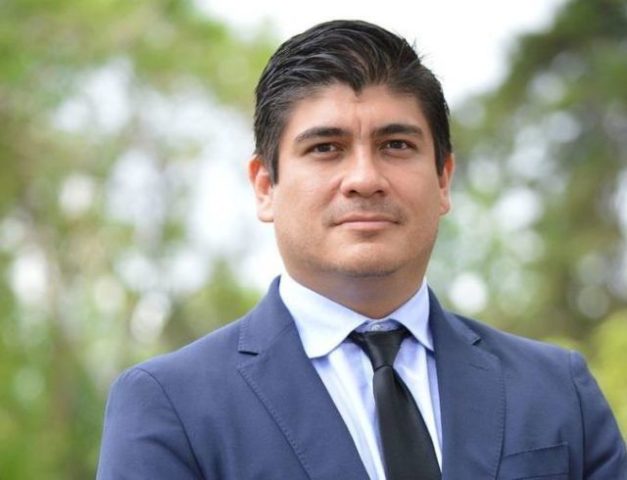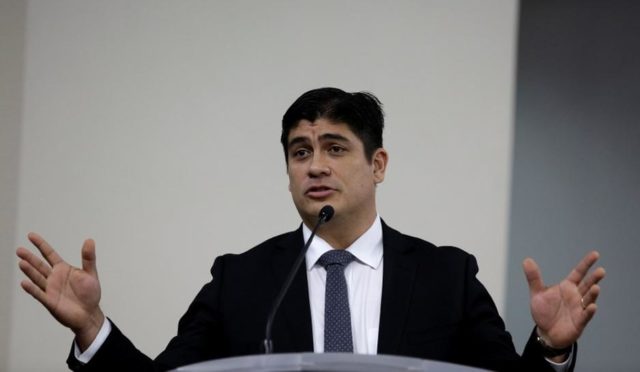
The President of Costa Rica, Carlos Alvarado, pleaded to the OECD Summit for international financing in favorable conditions to emerging countries, asserting that without “this economic vaccine” the global economy is not going to recover.
Alvarado participated this Monday, July 13th, in the opening of the Virtual Summit on Social Inclusion organized by the Program for Latin America and the Caribbean of the Organization for Economic Cooperation and Development (OECD) currently chaired by the Dominican Republic.
Under the title “Informality and Social Inclusion in times of COVID-19”, Alvarado accompanied the Secretary-General of the OECD, Ángel Gurría, and the President of the Dominican Republic, Danilo Medina, in the analysis of the effects by the Pandemic on the region and outlined national strategies for job creation, the transition to formal employment and measures for advancing towards greater social inclusion after the COVID-19 crisis, among other issues.
President Alvarado highlighted the importance of international financing in what he called “the economic vaccine”, to protect us against the Pandemic, ensuring that if there is no financial support in good conditions for emerging countries, the recovery of the global economy will be impossible.
In the specific case of Costa Rica, Alvarado presented the extraordinary actions that the country has taken in the social field, such as the following:
–“Bono Proteger”, based on a 100% online platform built in less than a month, which has allowed financial support to some 524,000 people affected by the Pandemic.
–Attention to more than a million students. Logistics redirection to deliver food directly to the homes of one million students.
–Virtualization of a large number of public and private services, facilitating the population’s access to services.
–Implementation of telework in the public and private sphere, allowing nearly 60 thousand people to continue their productivity under this modality.
–Creation of mechanisms to modify employment contracts, either by suspending them or reducing the workday, which has prevented the loss of employment by 210 thousand people who today continue with their labor contract relations.
–Legal amendments to minimize the negative impact that the disease could have on working people and their families. In this way, those who are ill or with a sanitary isolation order for suspicion of the disease can count on an economic subsidy to cope with the situation.
–Reduction of the minimum contributory base to social security, an effort to lower the operating costs of companies and thus avoid their closure. This guarantees access to health services for thousands of workers.
–Reduced cost insurance modality for up to five years, aimed at new micro-enterprises with five workers or less, having the objective that from the start these establishments become formal.

Alvarado stressed the importance of building a new job market, referring to the Transit Strategy to the Formal Economy -included in the process of accession of Costa Rica to the OECD- that allowed the creation of a solidarity health insurance at a very low cost for domestic workers and coffee pickers, among others.
The event was also attended by the Vice President of Colombia, Marta Lucía Ramírez; the Minister of Foreign Affairs of Peru, Gustavo Meza-Cuadra; the Secretary of Foreign Relations of Mexico, Marcelo Ebrard; the Minister-Chief of Cabinet of Brazil, Walter Braga Netto; and the Commissioner for International Associations, European Commission, Jutta Urpilainen.
On the other hand, the Costa Rican Minister of Foreign Trade and Coordinator for the Accession Process, Dyalá Jiménez; and the Minister of Human Development and Social Inclusion, Juan Luis Bermúdez, participated in the high-level panel “From an imminent problem to an emergency: the urgent need for a new, more inclusive social pact in Latin America and the Caribbean.”
The Summit will continue to be held during this week with a series of ministerial sessions on July 15th, 16th, and 17th. Participation is limited to invited authorities from Latin American and Caribbean countries and to international organizations.
On behalf of the Government of Costa Rica, the President of the Costa Rican Social Security Fund, Román Macaya, and the Minister of Human Development and Social Inclusion, Juan Luis Bermúdez, will be participating as panelists. Precisely, on Wednesday, the Secretary-General of the OECD will present the “Economic Study of Costa Rica 2020”, one of the most important evaluations for the country in its process of joining this organization.


